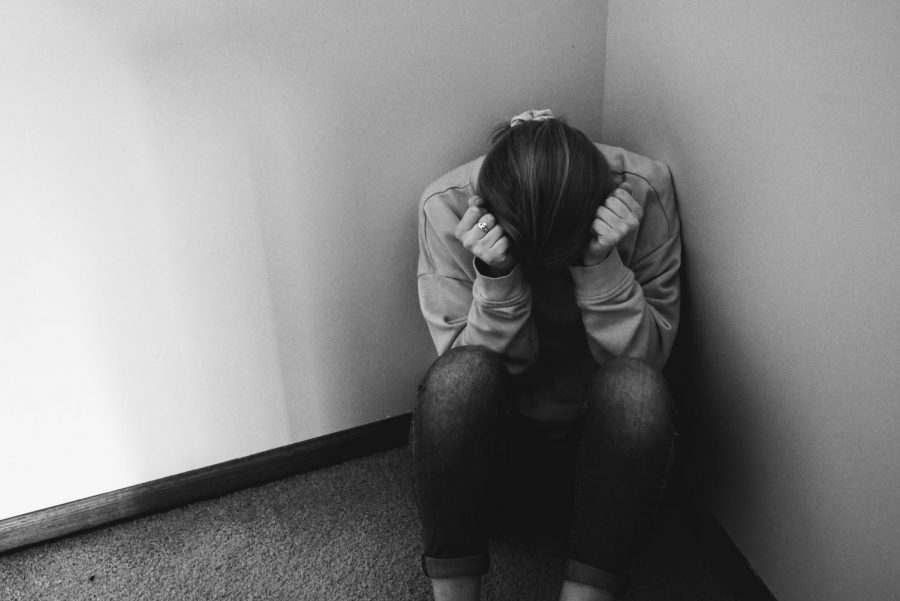Mental health professionals give advice for winter months
Professionals advise students to follow a routine to beat the pandemic winter blues.
A young girl sits in the corner with her head down.
December 8, 2020
DeKALB – With the winter comes Seasonal Affective Disorder, commonly known as seasonal depression, and this winter will be unlike any other due to COVID-19 as anxieties and negative emotions surge.
Students’ mental health has already been negatively impacted due to COVID-19, in a September survey, 75% of students reported that their mental health has worsened over the course of the pandemic, according to a survey conducted by the Active Minds Group. About 87% of these students experienced an increase in stress and anxiety, and another 78% experienced increased disappointment or sadness.
Seasonal Affective Disorder is when people experience intense mood swings as the seasons change, and are heavily affected by the shorter days during the winter months. It affects how a person thinks, feels, and even handles their daily activities, according to the National Institute of Mental Health’s website.
The most common type of Seasonal Affective Disorder is the winter pattern. There is also a summer pattern, but it is less common than the winter pattern, according to the National Institute of Mental Health’s website.
The best way for students to keep their mental health up during these times is to follow a routine, said Constance Victor, doctoral intern for the Counseling and Consultation Services.
“Structure helps us feel more normal and things feel less ungrounded,” Victor said.
A routine could be having a cup of coffee in the morning, getting on a Wednesday Zoom call with friends, or even exercising every other Tuesday, Victor said.
There is also a routine in waking up at the same time every day, said Karen White, director of the Psychological Services Center.
“Sleep is disrupted because students don’t have somewhere to be at 8:30 a.m.,” White said. “So, they stay up too late and end up sleeping through stuff.”
Utilizing good sleep hygiene and associating sleep patterns is about limiting the time spent in bed and trying not to do homework in bed, Victor said.
Other ways for students to keep their mental health up is to exercise, get fresh air when possible, have a virtual hangout with friends, delve into hobbies, eat well and try to limit screen time – particularly about the news, Victor said.
“The nature of online interaction is something physically, emotionally and mentally draining,” White said. “It’s more work to talk on Zoom than it is face-to-face.”
A great way to destress and limit screen time is by journaling, reading a book or practicing yoga, Victor said.
“It helps to think about ‘why am I trying to slug through this,’” White said. “You can’t lose sight of your future self – what excites you for after college and in your career.”
To keep track of their mental health, students can download the IntelliCare app, an English-only self-care app developed two years ago by a research team from Northwestern University and Counseling and Consultation Services, and students from both NIU and the University of Illinois-Chicago.
IntelliCare allows students to track their moods over time, take mental health screening questionnaires and even receive personalized feedback. There are also many different stress management tools in the app.
“We know that effective self-care helps students handle stress better and perform academically,” Andrea Drott, associate director of Student Wellness said in a Nov. 9 NIU Today article. “This app offers a really good opportunity for structured self-care that you don’t have to put a lot of thought or effort into.”
Practicing mindfulness is also a way for students to keep track of what they are working for and to keep their routines intact. Mindfulness is being in the present moment and being aware of and accepting of your emotions, said Jack Gordon, treasurer for the NIU Active Minds Group.
“If you talk yourself through your daily activities, you’re staying in the moment and not thinking about future anxieties,” Gordon said. “When you’re mindful you start realizing things you haven’t noticed before – whether it’s how the wind moves the leaves or stuff like that.”
If students are struggling to maintain their mental health, Counseling and Consultation Services Center is available 24/7 at 815-753-1206







